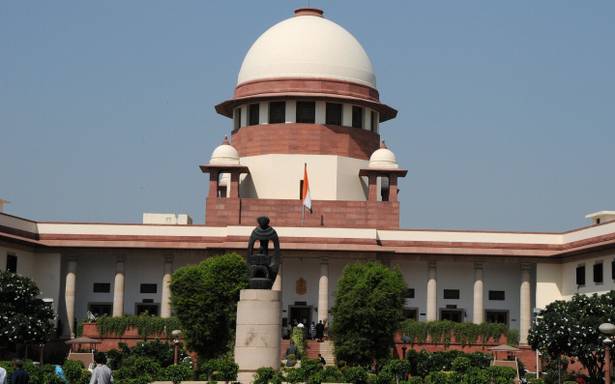Apart from several landmark cases like the triple talaq case, the Supreme Court of India handled in the year 2017 several PILs that may have left the judges and lawyers amused.
Here are 10 such PILs that were dismissed by the Supreme Court on the first day of hearing itself, but still attracted public attention:
Pictorial Warning on Liquor Bottles
The petitioning NGO asked that pictorial health warnings be added to liquor bottles similar to those for cigarettes and other tobacco products. The NGO’s petition cited a provision of the Constitution which dealt with a policy related to prohibition of alcohol.
The court, however noted that the constitutional provision was not a mandatory one and therefore basing the case on it reflected lack of diligence and merit. The PIL was dismissed along with a direction to the NGO to pay a fine of Rs 1 lakh “misuse of judicial process”.
Postpone Union Budget
A lawyer filed a case seeking to shift the Union Budget from its scheduled date of February 1 citing Assembly elections in five states. According to him, Budget announcements could have an influence on the voters.
But the apex court dismissed the plea, saying that there was “no valid reason” for the Budget to influence voters mind.
Ban on Burning of Effigies of Ravana on Dussehra
Anand Prakash Sharma, a social activist and a journalist, argued that a huge amount of money was being “wasted” every year by the burning of effigies during Dusshera in his PIL seeking a ban on the activity. He also pointed out that burning Ravana’s effigy was not mentioned in any religious scriptures.
The court however responded asking the petitioner if he had read the Article 25 of the Constitution which allows everyone the right to his/her religion. Dismissing the plea, the court noted that it did had “no jurisdiction to go into what is good or bad”, adding that the court handles only “what is legal and what is illegal”.
Make Yoga Compulsory in Schools
Two lawyers filed a petition asking the court to direct the Centre and state governments to add Yoga to school curriculums. The plea asked that a national yoga policy be framed, which would make yoga compulsory for students of Classes 1 to 8 .
The court questioned how the judiciary could prescribe what was taught in schools, noting that it was none of their business. It dismissed the PIL stating that “what is to be taught in schools is not a fundamental right.”
Declare Indus Waters Treaty Between India and Pakistan Unconstitutional
A PIL argued that the Indus Waters pact was not a treaty since it wasn’t signed in the name of the President of India, stating that it a tripartite agreement between three leaders and therefor “void ab initio” .
The court rejected the PIL, noting that the treaty which was signed in 1960 “has held good for more than half a century.”
Policy on ‘Vande Mataram’
The apex court refused to admit a plea seeking separate guidelines for Vande Mataram. The court observed that the Article 51A(a) of the Constitution (fundamental duties) had no reference to ‘National Song’, and only to National Flag and National Anthem.
Ban On a Book Criticising Caste System
A PIL was filed to ban on a book written by activist Professor Kancha Ilaiah Shepherd called Samajika Smugglurlu Komatollu. The petition objected to a chapter in the book which criticised the caste system prevailing in India . Dismissing the PIL, the top court used it as an opportunity to emphasise the fundamental right to free speech, noting that “curtailment of an individual writer/author’s right to freedom of speech and expression should never be lightly viewed.”
Ban Against MPs and MLAs to Practise as Lawyers
Advocate Ashwini Upadhyay filed a plea asking that lawmakers stop practicing as lawyers in courts.
According to him this practice was a conflict of interest, since some politicians sign in at Parliament at 11 am and then appear court for private clients. Upadhyay asked that the existing restriction on public servants and judges engaging in any other profession be applicable to lawmakers as well.
While the court found merit in these arguments, but it finally rejected the PIL on the grounds that there was no law to deal with such matters and that the judiciary can’t frame policy.
Stay Padmavati Release
A PIL sought that the release of the controversial Sanjay Leela Bansali movie Padmavati be stayed, alleging that it would affect religious sentiments and also on the grounds that the portrayal of various characters in the movie was defamatory and contemptuous.
The court pointed out the movie had not even submitted to the Censor Board for clearance, adding that the court will not “usurp power of that authority”.
The bench also censured some of the comments passed by some politicians related to the movie, noting that people holding “public offices should not comment on such issues”. It further stated that it was “prerogative of the Censor Board” to review the film and decide as to its suitability.
Set Minimum Educational Qualification to be Legislator
A plea filed sought that the central government be asked to specific minimum educational qualification for becoming an MP or an MLA.
The petition noted that since the people’s representatives need to handle a lot of papers, having minimum educational qualification would help legislators in the “application of mind,” rather having to rely on bureaucrats.
But the top court rejected the plea referring to the provisions available in the Representation of Peoples Act, which lays down the criteria for being a lawmaker. The Supreme Court stated that it was not within the purview of the court’s authority to direct Parliament to amend the law





